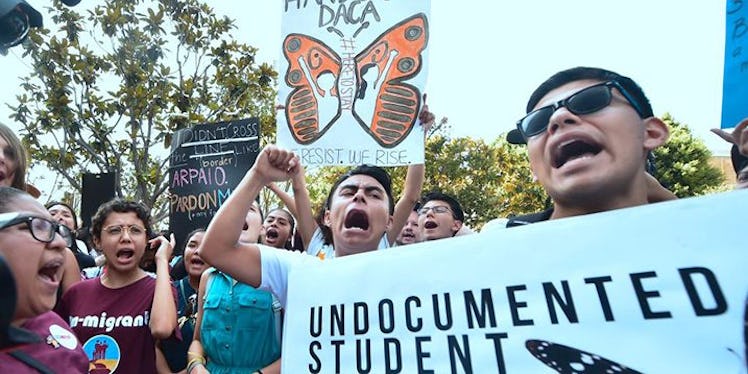
Here's What Will Happen To "Dreamers" After Trump's Decision On DACA
With President Donald Trump having decided to bring an end to the Deferred Action for Childhood Arrivals (DACA), an obvious questions is going around: What will happen to DACA and the "Dreamers" it was designed to protect from deportation? Those Dreamers -- undocumented immigrants who came to the United States as children -- now face an uncertain future. As the Trump administration made its decision official on Tuesday, Sept. 5, the degree of that uncertainty became clearer.
Some of the general implications of DACA's imminent end had already been reported -- like the administration's intention to the delay the end of the program for six months -- but more specifics surfaced on Tuesday.
Here was we know so far:
What will happen to DACA?
On Tuesday morning, Attorney General Jeff Sessions announced that DACA was "being rescinded." In a press conference, Sessions said,
Therefore, the nation must set and enforce a limit on how many immigrants we admit each year, and that means all cannot be accepted. This does not mean they are bad people or that our nation disrespects or demeans them in any way. It means we are properly enforcing our laws as Congress has passed them.
Sessions' announcement doesn't mean that the effects of DACA will completely shut down, though. Some Dreamers will still receive protection under the program for a certain amount of time (more on that below).
However, the way things look now, any prospect of Dreamers receiving any benefits similar to the type that DACA granted depends on a Congress cementing a similar program in law.
When former President Barack Obama implemented DACA, he did so via executive order, with a number of different motives at play. Trump's decision, on its face, gives Congress a chance go about it differently. But, as Politico reports, any effort to pass a DACA-related law is expected to result in a tense battle that causes rifts even among Republicans, as a number of notable GOP politicians are against ending DACA.
What happens to the Dreamers?
Because of the six-month delay, undocumented immigrants who have already been granted protection under DACA will not be affected until at least March 5, 2018, USA Today reports. In addition, if any current DACA recipients have permits that expire before March 5, they have until Oct. 5 of this year to apply for a two-year extension.
However, the Department of Homeland Security (DHS) will no longer be accepting any new DACA applicants as of Tuesday.
There's another implication for Dreamers as a result of Tuesday's decision: the information they gave the Obama administration can be used by the Trump administration to deport them.
That's because enrolling in DACA required Dreamers to submit certain private information that wasn't previously voluntarily shared with the government -- such as home addresses and the date of visa expirations. As The Daily Beast reported back in January, that info could possibly be used to aid any effort to deport Dreamers.
Whether or not that effort happens remains to be seen and depends on what Congress does or does not do in the next six months.